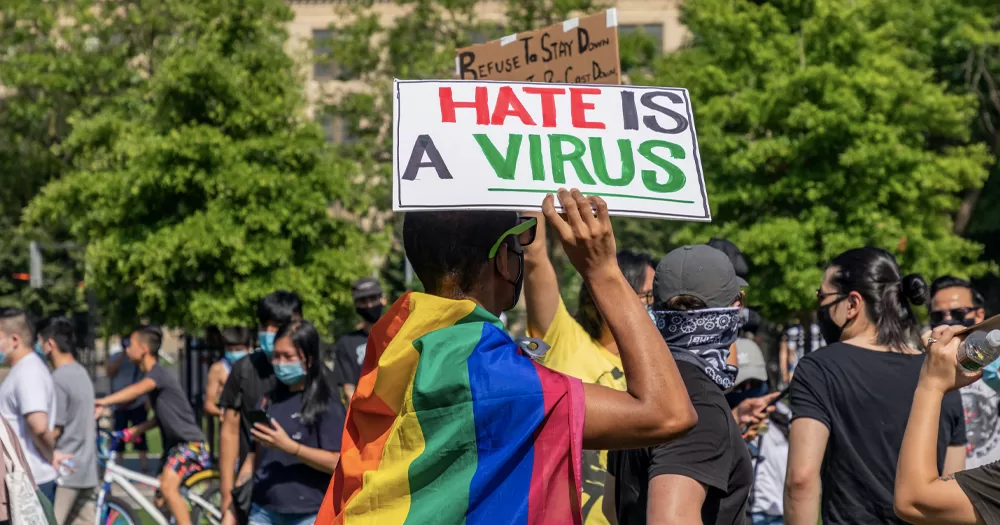The majority of Irish people believe that hate crime is a “serious or very serious problem”, and 39% think incidents have increased a lot on the island over the last five years, according to a study published on Monday, December 11. The research also found that there is widespread disinformation about hate crime in Ireland, with 43% believing hate crime legislation is already in place in the country.
Conducted by the University of Limerick (UL) in collaboration with the Queen’s University Belfast, the study is titled Public Understandings of Hate Crime: Ireland, North and South. Its findings are based on input from around 2,000 people in both the North and the Republic, who were surveyed in February 2023.
According to the study, 66% of respondents from both sides of the Irish border believe that hate crime is a “serious or very serious problem”. Specifically, 69% of those who were surveyed believe that it is a serious problem for trans people, followed by Black people (64%), gay, lesbian and bisexual people (60%) and Muslim people (60%).
Furthermore, respondents said that hate crime is a problem for members of the Traveller community (54%), older people (39%), disabled people (39%) and Jewish people (31%).
The study also measured people’s perceptions of responses to hate crime both in the Republic and in Northern Ireland, finding that the majority of people in both jurisdictions think that the current response by law enforcement is insufficient.
In the Republic, only 30% of people believe that Gardaí respond effectively to hate crime, with the percentage being even lower for the PSNI in Northern Ireland (18%). Regarding courts, only 22% in the Republic agree that the judicial system handles cases of hate crime effectively, while 20% believe the same in the North.
The researchers who conducted the study also voiced concerns over the fact that many Irish people seem to be misinformed about the topic, with 43% incorrectly believing that there is hate crime legislation already in place in the Republic. Moreover, 59% of respondents thought that, at present, a suspect can be charged with a hate crime in Ireland.
Amanda Haynes, Professor of Sociology at UL and Co-Director of the European Centre for the Study of Hate, commented on these findings, saying: “Our research shows that there is currently a lot of misinformation around the topic of hate crime across the island of Ireland. Such shortfalls in the public’s awareness of current policy responses is concerning.”
The findings are likely to put pressure on the government to accelerate the passing of the Incitement to Violence or Hatred and Hate Offences Bill 2022, which is expected to be voted on in the coming months.
“What the data shows is that there is enormous goodwill on both sides of the Border towards an inclusive approach to providing legislative interventions against being targeted for your identity,” said Prof Jennifer Schweppe of the University of Limerick. “But at the same time there are lower levels of public awareness, particularly of the criminal justice provisions that are currently in place, than we would like to see.”
The two researchers also commented on the riots that broke out last month in Dublin, with Professor Amanda Haynes saying: “The far-right in Ireland, I believe, is small, but I also believe that they’re dangerous and that we need to be constantly aware of the potential for people who may be disaffected for a variety of reasons… that those individuals might be mobilised or radicalised by the right.
“What the research shows is that we are at a turning point, and we have an opportunity now. We have a society that actually is very appreciative of difference and values difference, and we have to protect that.”
Referencing the findings about the trans community, she added that while they have “been the subject of very vocal and antagonistic debate publicly, it’s really good to see that has not seeped into or impacted on the very supportive and warm approach people are taking and that people have towards the trans community.”
© 2023 GCN (Gay Community News). All rights reserved.
Support GCN
GCN is a free, vital resource for Ireland’s LGBTQ+ community since 1988.
GCN is a trading name of National LGBT Federation CLG, a registered charity - Charity Number: 20034580.
GCN relies on the generous support of the community and allies to sustain the crucial work that we do. Producing GCN is costly, and, in an industry which has been hugely impacted by rising costs, we need your support to help sustain and grow this vital resource.
Supporting GCN for as little as €1.99 per month will help us continue our work as Ireland’s free, independent LGBTQ+ media.

comments. Please sign in to comment.